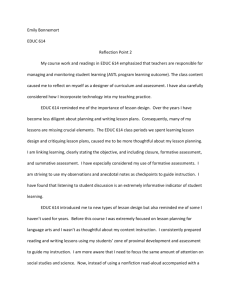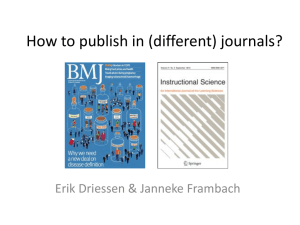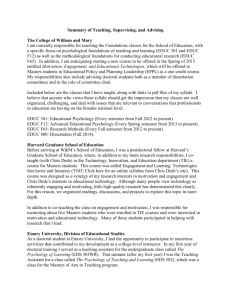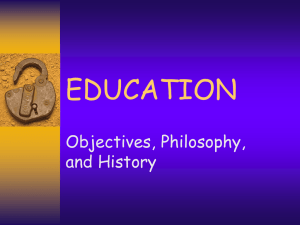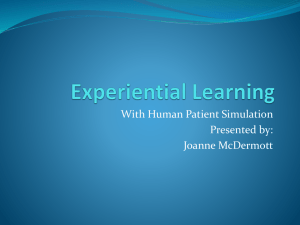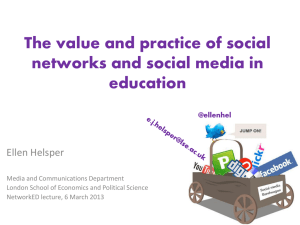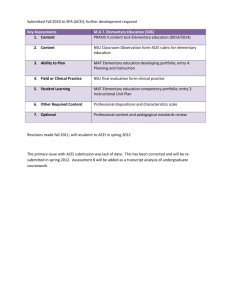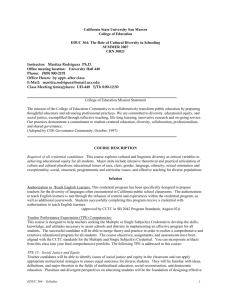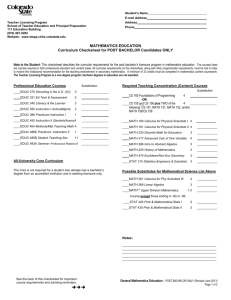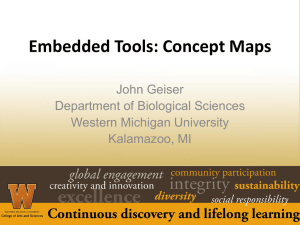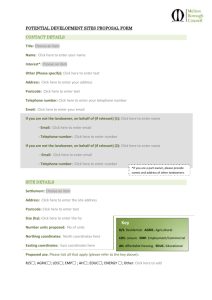course syllabus - University of Puget Sound
advertisement
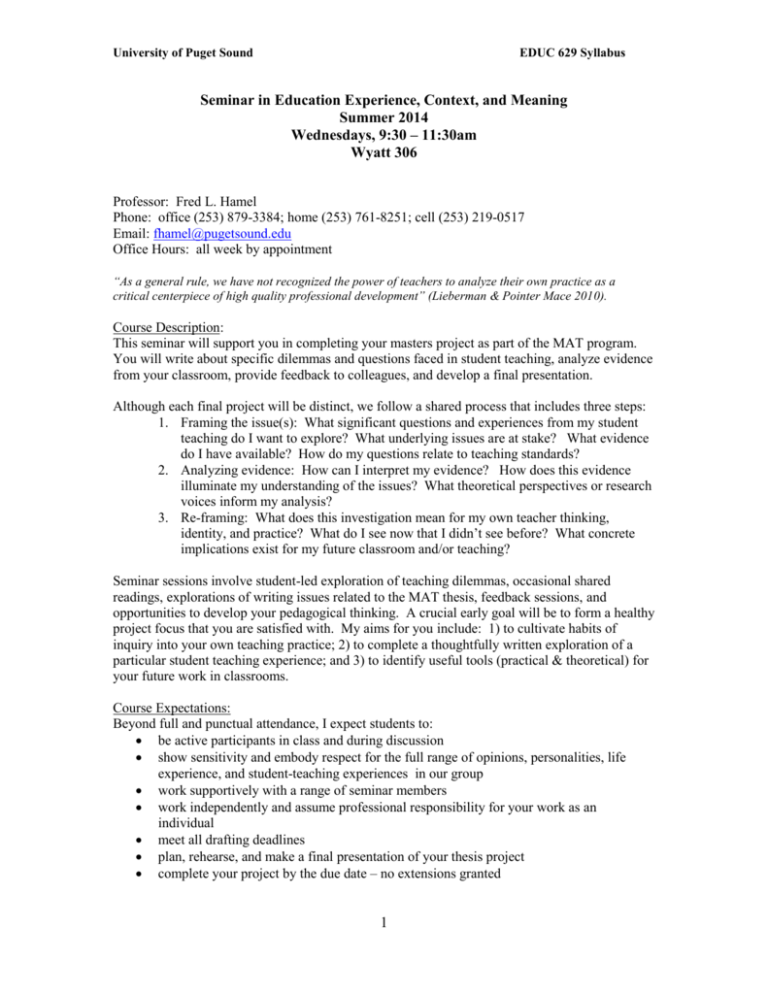
University of Puget Sound EDUC 629 Syllabus Seminar in Education Experience, Context, and Meaning Summer 2014 Wednesdays, 9:30 – 11:30am Wyatt 306 Professor: Fred L. Hamel Phone: office (253) 879-3384; home (253) 761-8251; cell (253) 219-0517 Email: fhamel@pugetsound.edu Office Hours: all week by appointment “As a general rule, we have not recognized the power of teachers to analyze their own practice as a critical centerpiece of high quality professional development” (Lieberman & Pointer Mace 2010). Course Description: This seminar will support you in completing your masters project as part of the MAT program. You will write about specific dilemmas and questions faced in student teaching, analyze evidence from your classroom, provide feedback to colleagues, and develop a final presentation. Although each final project will be distinct, we follow a shared process that includes three steps: 1. Framing the issue(s): What significant questions and experiences from my student teaching do I want to explore? What underlying issues are at stake? What evidence do I have available? How do my questions relate to teaching standards? 2. Analyzing evidence: How can I interpret my evidence? How does this evidence illuminate my understanding of the issues? What theoretical perspectives or research voices inform my analysis? 3. Re-framing: What does this investigation mean for my own teacher thinking, identity, and practice? What do I see now that I didn’t see before? What concrete implications exist for my future classroom and/or teaching? Seminar sessions involve student-led exploration of teaching dilemmas, occasional shared readings, explorations of writing issues related to the MAT thesis, feedback sessions, and opportunities to develop your pedagogical thinking. A crucial early goal will be to form a healthy project focus that you are satisfied with. My aims for you include: 1) to cultivate habits of inquiry into your own teaching practice; 2) to complete a thoughtfully written exploration of a particular student teaching experience; and 3) to identify useful tools (practical & theoretical) for your future work in classrooms. Course Expectations: Beyond full and punctual attendance, I expect students to: be active participants in class and during discussion show sensitivity and embody respect for the full range of opinions, personalities, life experience, and student-teaching experiences in our group work supportively with a range of seminar members work independently and assume professional responsibility for your work as an individual meet all drafting deadlines plan, rehearse, and make a final presentation of your thesis project complete your project by the due date – no extensions granted 1 University of Puget Sound EDUC 629 Syllabus Course Requirements Written Pedagogical Deliberation (70% of grade) This project is your primary independent task for the summer. It’s major work in short time. Your goal is to identify a particular and relevant dilemma you have faced in teaching, to frame the issue/experience in a compelling way both for yourself and for an audience of teacherlearners, to analyze classroom-based evidence uncovering new layers and ways of thinking in relation to this dilemma, and to draw conclusions for yourself as a beginning educator. You must be able to make connections between your analysis and Washington State’s teacher education standards (Standard 5) for effective teaching (see p.4). Your goal is less to solve the original dilemma as it is to engage us in the issue, uncover new dimensions of the problem, and expand the tools you have for responding – in other words to cultivate and demonstrate habits of strong practitioner reflection and growth. I will provide models of writing from previous years to support you through the process. Below is a broad overview of your project writing. Framing: Laying out a starting point or dilemma & naming the pedagogical problem--6-8 pages using detailed narrative to introduce the dilemma, grounding us in a classroom-based, pedagogical, or curricular issue helping us see why this issue matters to you significantly as a teacher connecting to Standard 5 posing a specific and focused question – rich enough to sustain significant exploration Evidence Analysis: Analyzing the issue using evidence and theory--10-15 pages selecting teacher-based and student-based evidence for analysis analyzing evidence to deepen your understanding of the issues applying theoretical lenses or voices to enlarge your understanding offering alternative explanations, understandings, and new questions Reflection: Reframing, drawing insights, implications and conclusions--6-8 pages personal insights, commitments, and final comments in light of your exploration implications of this analysis for teaching There are a variety of ways to approach your writing, but the above represents a general framework of expectations. Other Practices (30% of grade) Independent study and writing outside of class In class participation: self-driven independence, contributions to the group, engaged collegial interaction Meeting with advisor Timeliness: submitting assigned materials on time, attending punctually, bringing materials Final Presentation: Aug 8. Other Please include page numbers on any and all chapter drafts. Please staple or clip multiple page copies. 2 University of Puget Sound EDUC 629 Syllabus Tentative Meeting Schedule DATE May 6 June 25 Session 1 July 2 Session 2 ACTIVITY IN CLASS -Introductions, Overview -Assignment for June -Exploring early issues -Feedback on initial writing -Overview of MAT project -Dispositions -Features of model papers -Feedback on writing -Uncovering writing processes DUE July 9 Session 3 -Writing Feedback / Workshop -Debrief Exploratory Writing Read: Richert, 2012; Lampert1985; Ed Ldsp pieces 2010; teacher research excerpts Draft of Framing Bring selected evidence Read: Example writing Initial Evidence Analysis Revised Framing Read: Example writing Draft of Evidence Analysis July 16 Session 4 -Writing Feedback / Workshop -Discussion July 23 Session 5 -Schedule review -Peer feedback session July 25 (FRI) -Poster Session Workshop 10:30-11:30am, Wyatt 109 July 30 Session 6 Aug 2 (SAT) -Writing Feedback Session Aug 4 (MON) Session 7 9:30– 11:30am August 6 -Poster Session workshop -Evaluation August 8 (FRI) Course EDUC 629A Hamel EDUC 628A Askew -Poster Rehearsal session – all MAT students in Wyatt -Poster Presentation Day -10:30am – 2:30pm Draft of Reflection Revised Draft of Evidence Analysis Full Draft due Final Thesis due at 11:59pm Thesis Presentations Your Summer Course Schedule Day W Time 9:30– 11:30am M & TH 3:00 –5:00pm 3 University of Puget Sound EDUC 629 Syllabus AREAS OF INQUIRY: STANDARDS FOR TEACHER EDUCATION FOR EDUC 629: The Washington Administrative Code identifies knowledge and skill areas for teacher certification. In this course (EDUC 629), you will describe and analyze teaching dilemmas in relation to one or more of the standards below: Standard V (WAC 181-78A-270(1)) a. Effective Teaching (i) Using multiple instructional strategies, including the principles of second language acquisition, to address student academic language ability levels and cultural and linguistic backgrounds (ii) Applying principles of differentiated instruction, including theories of language acquisition, stages of language, and academic language development, in the integration of subject matter across the content areas of reading, mathematical, scientific, and aesthetic reasoning (iii) Using standards-based assessment that is systematically analyzed using multiple formative, summative, and self-assessment strategies to monitor and improve instruction (iv) Implementing classroom/school centered instruction, including sheltered instruction that is connected to communities within the classroom and the school, and includes knowledge and skills for working with others (v) Planning and/or adapting standards-based curricula that are personalized to the diverse needs of each student (vi) Aligning instruction to the learning standards and outcomes so all students know the learning targets and their progress toward meeting them (vii) Planning and/or adapting curricula that are standards driven so students develop understanding and problem-solving expertise in the content area(s) using reading, written and oral communication, and technology (ix) Using technology that is effectively integrated to create technologically proficient learners b. Professional Development Developing reflective, collaborative, professional growth-centered practices through regularly evaluating the effects of his/her teaching through feedback and reflection A comment about standards from Fred: Standards are used and experienced in multiple ways in the current educational context. Standards can help direct our educational efforts, push us toward thoughtful goals, and help all educators to be accountable to a wider community. On the other hand, some uses of standards can negatively affect quality – for example, in forcing a disconnect between learner needs and teacher thinking, or when we experience standards as hoops to jump through….. While our MAT work is always connected to state standards, I ask that your thesis starting point pertain to issues you are passionate about and that will genuinely support your teacher-learning. If you have questions about the suitability of a question or area of inquiry in relation to Standard V, be sure to talk this over with me. 4 University of Puget Sound EDUC 629 Syllabus Course Texts There are no required texts for this course, but occasional readings may be distributed. Your primary resources for this course are your own classroom-based evidence, plus readings that you select to further investigate your core teaching questions. M.A.T. Program Goals To prepare teachers who: 1) have deep understanding of subject matter and pedagogies that teach for understanding 2) have ability to manage the complexities of teaching 3) promote student learning of challenging content 4) have ability to reflect on one’s own practice, to look for principles underlying what “works” or “does not work” and to persist in determining one’s own appropriate practice 5) have commitment to serving everyone’s children, particularly those who historically have not been well-served by traditional schooling 6) have ability to learn and work in collaborative fashion, and to create settings in which others can learn and work 7) have capacity to engage in the remaking of the profession and the renewal of schools with understanding of the social and cultural context in which students live and learn Seminar Members: Lacy Clark Alex Furlow Ryan Jobe Doug King Sha’Ran Lowe Jared Prince Kathryn Miller Dani Sage Connor Seaman Bryan Sullivan Shelby Wickett Student Taught @ Puyallup High School Mt. Tahoma High School Lincoln High School Mt. Tahoma High School Lincoln High School South Kitsap High School Puyallup High School Fife High School Science & Math Institute Curtis High School Giaudrone Middle School Subject or Area: English/Language arts Social Studies/English History/Social Studies History/Social Studies English/Language arts History/Social Studies English/Language arts English/Language arts History/Social Studies English/Drama English/Language arts “Practitioner knowledge comes from problems of practice as they are ‘detailed, concrete, and specific’… [and] more than that, the knowledge must be made public so that it can be shared, critiqued, and verified” (Lieberman & Pointer Mace 2010). Lieberman, A. & Pointer Mace, D. (2010). Making practice public: Teacher learning in the 21st century. Journal of Teacher Education 61 (1-2): 77-88. 5
